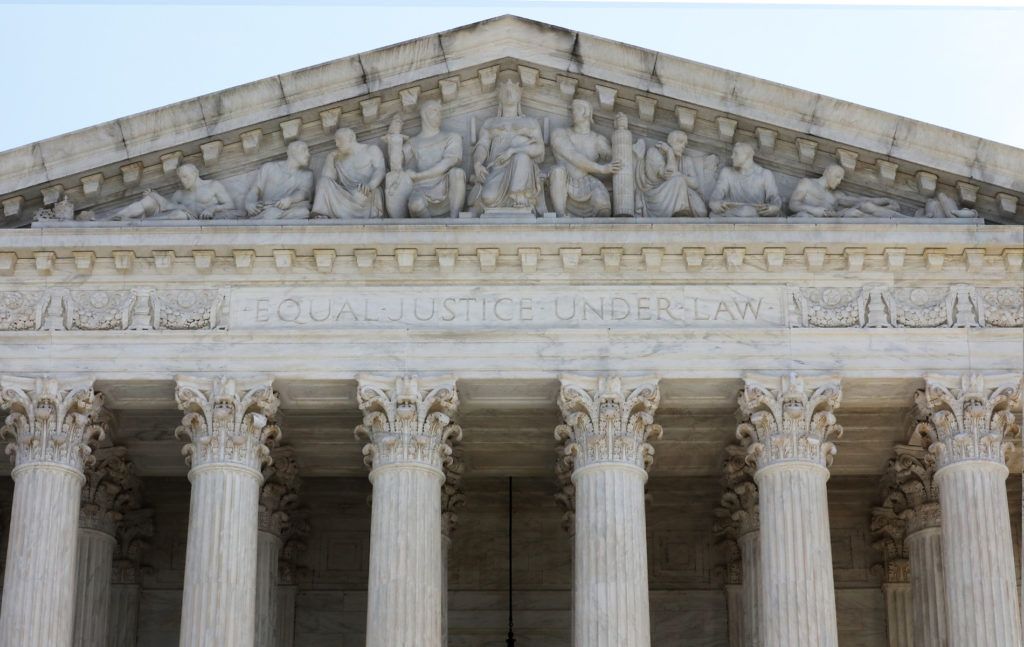
WASHINGTON (BP) – The U.S. Supreme Court heard oral arguments April 24 in a case involving an Idaho law which bans nearly all abortions in the state.
The case involves a challenge to the law, known as the “Defense of Life Act,” which makes it a felony for doctors to perform most abortions, except those performed when necessary to save the life of the mother.
On Jan. 5, the Supreme Court ruled Idaho can enforce the law while the court case is being resolved. This ruling put on hold a lower court ruling which blocked the Idaho law, based upon a lawsuit filed by the Biden administration.
The Justice Department has argued that Idaho’s ban on abortion is preempted by a federal law passed in 1986 called the Emergency Medical Treatment and Labor Act (EMTALA), which requires hospitals that receive Medicare funds to provide emergency medical care. Their challenge to Idaho’s abortion ban argues that abortion is implied as a necessary component of emergency medical care.
Two cases, Moyle v. United States and Idaho v. United States, were consolidated by the Supreme Court to be heard together. Mike Moyle is the Speaker of the Idaho House of Representatives. A decision on the case is expected by early summer.
“Today, the Supreme Court heard oral arguments centering on the Biden Administration’s claim that there is a clash between Idaho’s Defense of Life Act and the federal Emergency Medical Treatment and Labor Act, or EMTALA,” said Hannah Daniel, policy director for the Ethics & Religious Liberty Commission (ERLC).
“Both Idaho’s pro-life law and EMTALA were passed with the intention of protecting the lives of both women and their preborn children, but the Biden Administration has twisted EMTALA to force emergency room doctors to provide abortions, disregarding the requirement of EMTALA to care for the preborn child. For Southern Baptists, this case doesn’t merely address a legal question. It underscores the need to defend life, protect conscience rights, and uphold the dignity of every human being, born and preborn. We affirm the sanctity of all life and firmly reject the misuse of vital statutes like EMTALA that were initially developed to protect life and urge the Court to rule accordingly.”
During opening arguments, attorney Joshua Turner from Idaho Attorney General Raúl Labrador’s office, spoke about the role of state law regarding its relation to EMTALA and its enforcement.
“When Congress amended the Medicare Act in 1986, it put EMTALA on a centuries-old foundation of state law,” Turner said. “States have always been responsible for licensing doctors and setting the scope of their professional practice. Indeed, EMTALA works precisely because states regulate the practice of medicine. And nothing in EMTALA requires doctors to ignore the scope of their license and offer medical treatments that violate state law.
“The Court should reject the administration’s unlimited reading of EMTALA and reverse the district court’s judgment.”
Elizabeth Prelogar, solicitor general of the U.S., spoke on behalf of the Biden administration in the case. She argued Idaho’s law contradicts with EMTALA by not allowing doctors to perform abortion in cases where pregnancy presents a “grave danger” to either the life or “heath” of the mother.
“EMTALA’s promise is simple but profound,” Prelogar said. “No one who comes to an emergency room in need of urgent treatment should be denied necessary stabilizing care. This case is about how that guarantee applies to pregnant women in medical crisis.
“In some tragic cases, women suffer emergency complications that make continuing their pregnancy a grave threat to their lives or their health. In cases like these, where there is no other way to stabilize the woman’s medical condition and prevent her from deteriorating, EMTALA’s plain text requires that she be offered pregnancy termination as the necessary treatment. And that’s how this law has been understood and applied for decades.
“That usually poses no conflict with state law. Even states that have sharply restricted access to abortion after Dobbs generally allow exceptions to safeguard the mother’s health. But Idaho makes termination a felony punishable by years of imprisonment unless it’s necessary to prevent the woman’s death … in the narrow circumstances involving grave medical emergencies, Idaho cannot criminalize the essential care that EMTALA requires.”
The attorneys then faced questions from the justices.
Idaho’s Defense of Life Act was originally enacted in 2020 and later took effect after the Supreme Court’s historic overturn of Roe v. Wade in June 2022.
Under the law, emergency room doctors who illegally perform an abortion are potentially subjected to fines, suspension or revocation of medical license and jail terms up to five years.
They are also subject to Idaho’s civil law, which allows immediate and extended family members to sue for up to $20,000.
In August 2022, a U.S. District judge agreed with the U.S. Department of Justice that Idaho’s law violated EMTALA and issued a temporary injunction, partly blocking the law from taking effect.
The Idaho Legislature appealed to the 9th Circuit Court, and a trio of judges from the federal appeals court reversed the injunction with an order issued in September 2023, allowing the state’s ban on abortion to stay in effect.
That decision only remained effective for about two weeks. The injunction was reinstated when the full panel of appellate judges opted to reexamine the case “en banc,” implying that a new, randomly selected group of judges would reconsider the case and deliver a fresh verdict. This rehearing was planned for Jan. 23, but was rendered unnecessary when the Supreme Court decided to review the case.
In a similar case, the 5th Circuit Court of Appeals recently determined that ER physicians in Texas were not required to perform emergency abortion care under EMTALA, in a decision announced just days before the High Court agreed to rule on Idaho’s law barring abortion.
“Emergency room doctors are more than capable of quickly managing life-threatening situations for mothers like ectopic pregnancies with the utmost care,” said ERLC President Brent Leatherwood. “But they should never be forced to perform elective abortions that terminate the life of a preborn child. The Supreme Court’s decision to review this case is potentially a positive step to both uphold a state’s action to protect life and rebuke the federal government for doing Planned Parenthood’s bidding.”
Leatherwood also noted the importance of continuing to fight for the pro-life cause amid ongoing legal battles.
“It is imperative for all of us who care about the lives of preborn children, their mothers and families to make it clear that abortion is wrong and the ability to end a defenseless life is no freedom at all,” Leatherwood said.
Tuesday’s hearing comes less than a month after the high court heard oral arguments on a case regarding the availability of mifepristone, a drug commonly used in medication abortions.

























